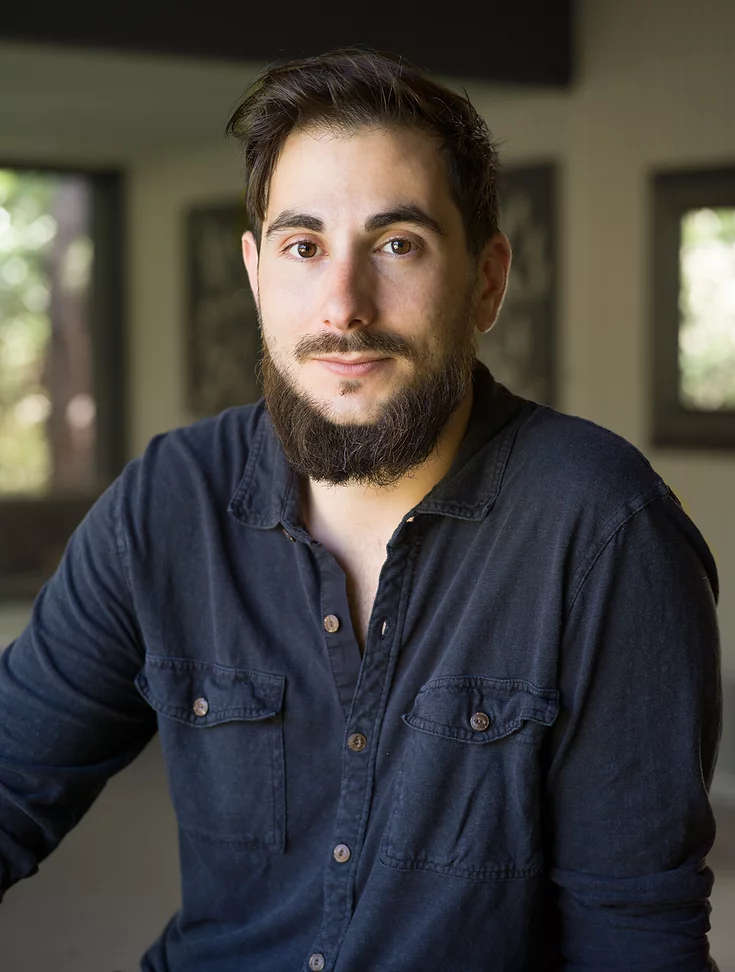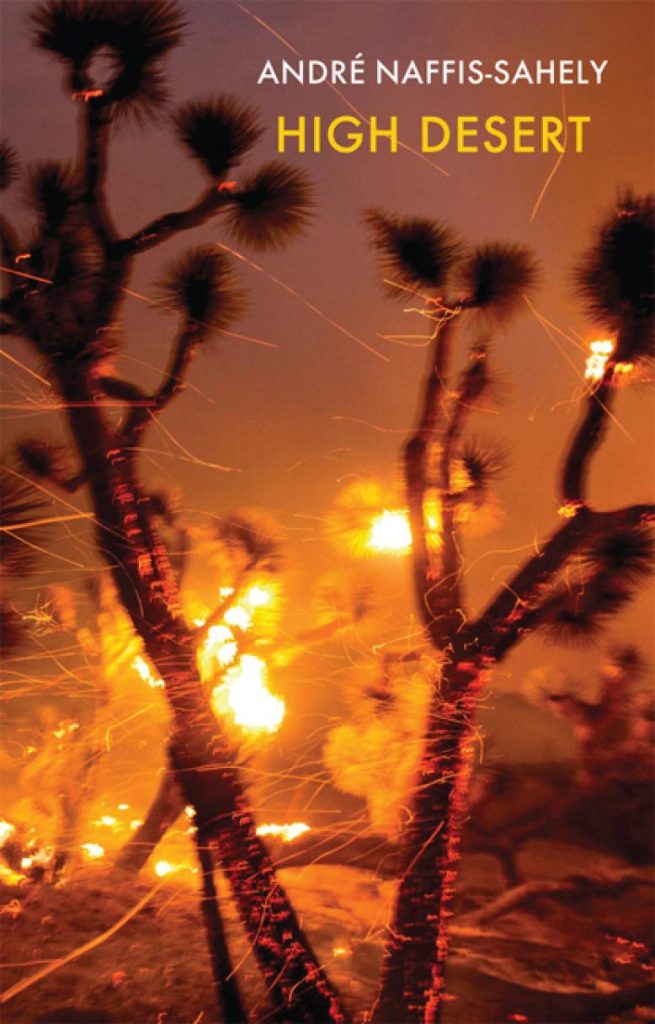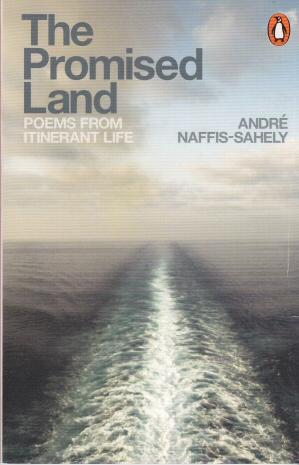Poetry as Acts of Resistance: An Interview with André Naffis-Sahely
André Naffis-Sahely sent me an email prior to our zoom meeting to apologise for running ten minutes late, which is still considered twenty minutes early in California time. When he arrives, he unnecessarily apologises again and explains how he is, ‘all hands on deck’ as he is preparing to go to print with the Spring Edition of Poetry London, where he has been editor since 2021.
There is an overwhelming calm about his presence as he smiles comfortingly into the camera from a room just outside of San Francisco in the college town of Davis. André Naffis-Sahely truly is a man of the world. He has travelled extensively and if you have read his work it will be obvious he has a deep feeling for land and the history of it. He was born in Venice, Italy to an Iranian father and an Italian mother and was brought up in Abu Dhabi.
We begin by speaking about his new collection of poems High Desert, which is set for release on 22 June, 2022. He was kind enough to send me the manuscript in advance and admits to it being the first time he is getting the chance to talk about the collection. It’s an astounding follow up from his debut publication of The Promised Land: Poems from Itinerant Life, which is another outstanding work.
André claims to be, ‘old school in certain ways,’ as he talks about developing his collection thematically and his inclusion of quotations at the beginning of sections, which he says, ‘illustrate the intellectual journey of how you get to those sections.’ He continues to reflect on one of the last quotations he selected, which is by Lithuanian Polish poet, Czeslaw Milosz, ‘I did not find California it was given to me.’ André considers the quote aloud, ‘and that’s exactly, I think, what happened to me.’ He proceeds to tell me he left the UK in 2014 expecting to return quickly, but he met his American partner at a residency and as a result he moved to America. He tells me he never really thought he’d live in America as he was very happy in London in the twelve years he’d been living in the UK.
After a couple of years in the States, he and his partner drove west to Los Angeles. ‘We moved there on a whim, as part of the American tradition of packing up your car and moving cross country.’ Somewhere between the erected buildings in the cities and the interstates cutting through the American landscape High Desert was born.
‘Suddenly I’m in Los Angeles, a city I never thought I’d be in and found myself really fascinated with the hidden histories of the place; for the most part we tend to think of it as America’s plastic dream factory,’ although he admits after living in Los Angeles for over five years, the plastic dream factory crowd does exist, ‘but it’s only a very small piece of a larger puzzle.’ This is where we draw the most glaring comparison between his new collection and The Promised Land; he has a fascination with boomtowns, which makes sense considering he grew up in a boomtown and as he rightly states, ‘California still has that boomtown atmosphere, L.A. still very much has that boomtown feel, in the backyards of L.A. where the book is set is where you see almost perfectly preserved ruins of the 20th century American empire.’ He ponders the ghost towns, abandoned communes and so on. Smiling as he refers cheekily to the visual elements of the landscape as, ‘grotty desert chique,’ but takes on a more serious tone as he asks rhetorically, ‘but what are the stories behind it? Who are the people who made this happen?’
Our conversation about California continues, a state I can relate deeply to as I lived there myself for over ten years, so I find it both amusing and engaging as he ruminates on the American attitude towards the west, in particular California and especially Los Angeles as a place lacking a certain culture and history. This he rightly refers to as, ‘a myth and an illusion’, and sees his work on High Desert as a way of tearing down those very illusions in a quest as a poetic historian to see what he can uncover.
The closing section of High Desert titled, ‘A People’s History of the West’ is comprised of a series of found poems which André arranged using direct quotations, which helps him rip away the illusions directly and allows him to confront certain issues head-on. There is particular power in using the people’s own words which he is very aware of, as he tells me it aided him in confronting some of the more controversial subject matters, such as the Chinese Exclusion Act. By direct use of the people’s words he’s able to, ‘show the power and the evil and the vileness of the language used at the time.’ He does this by masterfully quoting demagogue Denis Kearney followed by a poem composed of lines uttered by the anti-racist activist Wong Chin Foo.
We talk briefly about his translation work, which I had planned to leave until later in the discussion, but the opportunity arrives sooner than expected as we talk through the final sequence of High Desert. I recognised that the section is created out of found poems, which are comprised of direct quotations arranged into the resulting poems. This requires such an attentiveness and craft for language I enquire whether his work translating texts enhances his ability to compose such work along with his background as an editor? It is something he confesses he has not necessarily considered, but as he thinks about it, he is inclined to agree. Reflecting on the section of his new book in question, ‘it’s a matter of interpretation, you’re there as an ambassador presenting these words,’ which is clear that he understands the responsibility involved in utilising the words of others.
Continuing the topic of translating text André shares how he felt it important to find a voice similar to his in another language. He spent the better part of a decade translating a number of books a year and despite referring to himself as semi-retired due to his editorial work, he still has the twinkle in his eye that expresses a deep affection for translation.
I am curious about how the success of his debut book influenced his approach to a follow up collection. He tells me about his desire to avoid it being a book of b-sides and to make something new while still maintaining the best parts of The Promised Land, which he does quite masterfully. It is clear both collections are written by the same person but as he explains there is a shift in gears where High Desert is concerned, this is especially true in the sequence of the found poems, which he tells me he’d never written before and he describes as an ‘attempt to take a holiday from the lyric ‘I’.’
As our conversation begins to flit between his first two books, we discuss other topics addressed in both collections, shifting focus to The Promised Land but it’s also impossible not to draw some kind of parallel as we discuss immigration and boomtowns. ‘Immigration isn’t a one-way street: while a few make their fortune, many wind up back where they started, unless you go in rich there’s always a chance, you’ll come out poorer than when you went in.’ Initially referring to his experiences as an immigrant in the Emirates, he is quick to draw a comparison to the California Gold Rush. Continuing to tell me that he held hope that the multicultural nature of the United Arab Emirates would lead to healthy literature about the place but as he points out, with a little more weight to his voice ‘and it never did.’ He proceeds to show me a book he has being teaching from called Temporary People by Deepak Unnikrishnan. Despite growing up around the corner from each other they didn’t know one another. He draws particular attention to the title and says, ‘that’s what we are’ as he explains that both that book and The Promised Land are banned in the Emirates, which he understands to an extent. Pointing out to me the Emiratis are outnumbered ten to one in their own country, which is a very unique experience, ‘the local government has this desire to make sure the immigrant culture doesn’t get to leave a record of itself behind.’ He speaks about the importing of immigrants who were brought in to perform specific functions and the understanding was they would then leave or return to where they came from, ‘as you and I both know that’s not the way life works.’ Proceeding eloquently, he speaks off the cuff about the importation of ten million people to undertake what he considers to be a modern engineering miracle in the Emirates; ‘once you do that, you have to pay the consequence as horrible a way of putting it as it is, of dealing with the people that you imported and the culture they created in that place.’ Circling back, he tells me that if I want to read further about the immigrant culture in the Emirates, my only options are the novel by Unnikrishnan and his own book The Promised Land, he tells me he was very aware of the lack of literature around this topic. While writing his first book he believed he had a responsibility to leave some sort of record behind, not simply about his own family but what it is like to be a migrant worker in the Emirates. This prompted me to quote a line from The Promised Land which had stayed with me since I first read it, ‘only two out of ten people die in Abu Dhabi’. He smiles at the reference to his work and proceeds to tell me about the quandary most writers find themselves in when reflecting on one’s own work and the reactions of the reader. It is particularly present in a collection presented by a poet; ‘it’s funny as a poet, the poem you think is best is the one that no one likes and the one you think that is completely throw away like that one, that’s the one that ends up becoming the one everybody likes, it’s one of the interesting experiences of putting the work out there.’
I ask him if anything has surprised him since he put his work out there and he proceeds to tell me he is scheduled to do a zoom reading for Deepak Unnikrishnan’s class at NYU Abu Dhabi. He was unaware Deepak had been teaching his poems for years and explains that he was told by Deepak that his work is wildly polarising. When his poems are taught, there seems ‘a neat fault line erupts in the classroom and there is love and hate on either side of the fault line, so neutrality doesn’t seem to be an option,’ which he says is unfortunate because this was never his intent.
Once we navigate one controversial topic, we flirt with more controversy, as he mentions an article by Rory Waterman that was recently published in Poetry London about do-goodery in poetry. I believe this to be an issue with poetry in the same as André does as. He explains, ‘especially these days, there’s an emphasis that we need to be good people in our poem’s and I think actually the human experience means we are often not good people and I think charting those difficult moments can help us be better people.’ He continues, ‘if I’m going to publish poems they should at least be honest as far as I think they’re being honest; it’s not like I’m voicing universal truths, I’m voicing my own truth.’
During our conversation I am getting a sense of the man and it is perfectly aligned with my knowledge of his work. There is a compassion to André in his words, his voice and his overall demeanour, yet there is still a bluntness and a willingness to engage in topics which could be considered polarising for whatever reason.
We encounter a railroad switch in our conversation as we begin speaking of the homeless crisis, with particular attention to California albeit not exclusively. This leads us to topics of transience and nationalism and he speaks with a deep affection for the U.K. which he says he never left spiritually. Reflecting on his motivations on writing about transience and homelessness from a more philosophical view, he recalls taking it personally when Theresa May made the infamous statement, ‘If you believe you are a citizen of the world, you are a citizen of nowhere,’ given especially that he very much considers himself a citizen of the world. He continues to explain how nationalism breeds a sort of homelessness because, ‘unless you’re willing to really stick to the family line and imbibe all the peculiar bigotries and idiosyncrasies that every culture has then you’re out of step with that, you’re unhoused from your own culture, homeless in a way.’ He draws on the distinction between physical homelessness which is particularly grim in California at present and a general transience of the American West and poses the question, ‘how do we fit in to a globalised world that at the same time is getting more travelized every day? We are living in an era of hyper-nationalism.’
I’m aware we have now talked much longer than the hour we planned, but André is incredibly gracious with his time. Our conversation has covered a variety of topics and his interest in life is both present and contagious. It is quite clear André is a man with a thirst for knowledge, which brings me to ask him why use poetry as your main vehicle to navigate such terrain? He answers succinctly, ‘I have an axe to grind.’ That is followed by his infectious laughter. He elaborates by referring to the Chilean poet, Nicanor Parra whom André tells me once said, ‘a poet should be a thorn in society’s side’. This resonated with him in his teens.
André views leaving a record behind as, ‘an act of resistance,’ but is careful to point out that he doesn’t want to take that too far because we live in an age of internet activism and what he’s doing is far removed from that. The reference to internet activism brings about the cheeky boyish smile which makes him so approachable as he continues to tell me his intent, ‘to use poetry as a scalpel to cut through various layers of misapprehensions we have and just see the human being.’ He describes poetry as an archaeology an archaeology of history, memory and humanity.
Hopefully the work of André Naffis-Sahely will continue to etch itself into the fabric of our humanity and may his words be preserved like the paintings in the Chauvet-Pont d’Arc Cave.
Steven Chamberlain




Leave a Reply